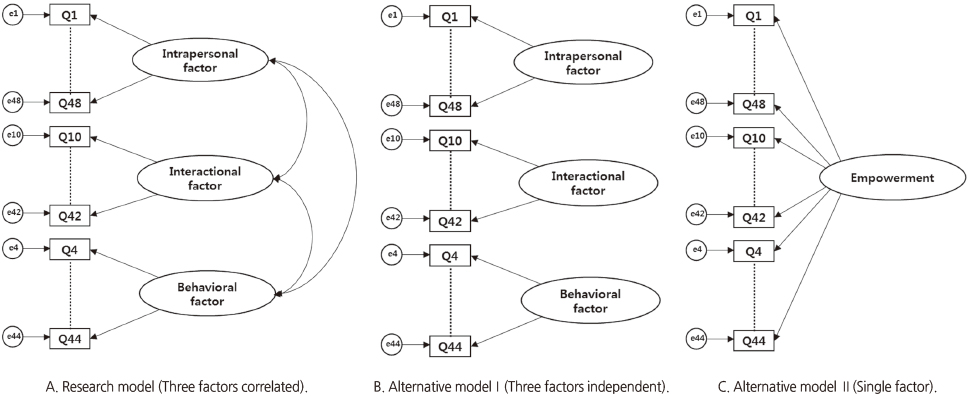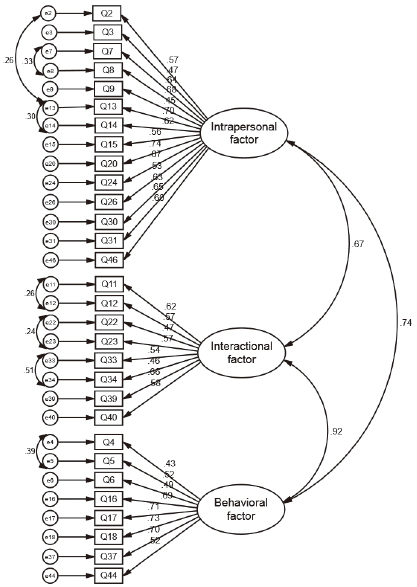J Korean Acad Nurs.
2015 Aug;45(4):613-624. 10.4040/jkan.2015.45.4.613.
Development and Validation of the Empowerment Scale for Woman with Breast Cancer
- Affiliations
-
- 1Division of Nursing Science, Ewha Womans University, Seoul, Korea. hyojungp@ewha.ac.kr
- KMID: 2164402
- DOI: http://doi.org/10.4040/jkan.2015.45.4.613
Abstract
- PURPOSE
The purpose of this study was to develop a scale to evaluate empowerment in woman with breast cancer and to examine the validity and reliability of the scale.
METHODS
The development process for the initial items included a literature review, interviews, and construction of a conceptual framework. The identified items were evaluated for content validity by experts, resulting in 3 factors and 48 preliminary items. Participants were 319 women with breast cancer recruited to test reliability and validity of the preliminary scale. Data were analyzed using item analysis, confirmatory factor analysis, criterion related validity, internal consistency and test-retest reliability.
RESULTS
The final scale consisted of 30 items and 3 factors. Factors, including 'intrapersonal factor' (14 items), 'interactional factor' (8 items), and 'behavioral factor' (8 items), were drawn up after confirmatory factor analysis. Goodness of fit of the final research model was very appropriate as shown by chi2/df=1.86, TLI=.90, CFI=.92, SRMR=.06, and RMSEA=.05. Criterion validity was evaluated by total correlation with the Cancer Empowerment Questionnaire .78. Cronbach's alpha for total items was .93 and test-retest reliability was .69.
CONCLUSION
Findings from this study indicate that the scale can be used in the development of nursing interventions to promote the empowerment of women having breast cancer.
Keyword
MeSH Terms
Figure
Cited by 1 articles
-
Reliability and Validity of the Clinical Competency Scale for Nursing Students
Bo Young Kim, Myeong Jeong Chae, Yun Ok Choi
J Korean Acad Community Health Nurs. 2018;29(2):220-230. doi: 10.12799/jkachn.2018.29.2.220.
Reference
-
1. Korean Breast Cancer Society. Breast cancer facts & figures 2013 [Internet]. Seoul: Author;2013. [cited 2014 July 1]. Available from: www.kbcs.or.kr/journal/file/2013_Breast_Cancer_Facts_and_Figures_updated.pdf.2. Park JH, Jun EY, Kang MY, Joung YS, Kim GS. Symptom experience and quality of life in breast cancer survivors. J Korean Acad Nurs. 2009; 39(5):613–621. DOI: 10.4040/jkan.2009.39.5.613.3. Lim IS. Breast cancer, damaged body and sense of femininity crisis. J Korean Womens Stud. 2006; 22(4):5–46.4. Kedde H, van de Wiel HBM, Weijmar Schultz WCM, Wijsen C. Subjective sexual well-being and sexual behavior in young women with breast cancer. Support Care Cancer. 2013; 21(7):1993–2005. DOI: 10.1007/s00520-013-1750-6.5. Park EY, Yi M. Illness experience of women with breast cancer in Korea: Using feminist phenomenology. J Korean Acad Adult Nurs. 2009; 21(5):504–518.6. Fotoukian Z, Shahboulaghi FM, Khoshknab MF, Mohammadi E. Concept analysis of empowerment in old people with chronic diseases using a hybrid model. Asian Nurs Res. 2014; 8(2):118–127. DOI: 10.1016/j.anr.2014.04.002.7. Jerofke TA. Concept analysis of empowerment from survivor and nurse perspectives within the context of cancer survivorship. Res Theory Nurs Pract. 2013; 27(3):157–172. DOI: 10.1891/1541-6577.27.3.157.8. Zimmerman MA. Psychological empowerment: Issues and illustrations. Am J Community Psychol. 1995; 23(5):581–599.9. Brown C, Bornstein E, Wilcox C. Partnership and empowerment program: A model for patient-centered, comprehensive, and cost-effective care. Clin J Oncol Nurs. 2012; 16(1):15–17. DOI: 10.1188/12.cjon.15-17.10. Crawford Shearer NB, Fleury JD, Belyea M. Randomized control trial of the health empowerment intervention: Feasibility and impact. Nurs Res. 2010; 59(3):203–211. DOI: 10.1097/NNR.0b013e3181dbbd4a.11. Lee R, Kim SH, Lee KS, Seo MK. Development and validation of self-efficacy scale for self-management of breast cancer (SESSM-B). J Korean Acad Nurs. 2012; 42(3):385–395. DOI: 10.4040/jkan.2012.42.3.385.12. Miller WR, Lasiter S, Bartlett Ellis R, Buelow JM. Chronic disease self-management: A hybrid concept analysis. Nurs Outlook. 2015; 63(2):154–161. DOI: 10.1016/j.outlook.2014.07.005.13. Yi M, Ryu YM, Hwang E. The experience of self-help group activities among women with breast cancer in Korea. Korean J Adult Nurs. 2014; 26(4):466–478. DOI: 10.7475/kjan.2014.26.4.466.14. Harvey JA, Strahilevitz MA. The power of pink: Cause-related marketing and the impact on breast cancer. J Am Coll Radiol. 2009; 6(1):26–32. DOI: 10.1016/j.jacr.2008.07.010.15. Park JS, Oh YJ. The effects of a program on cancer symptoms, self-efficacy, self-esteem, and empowerment in home-based cancer patients. J Korean Acad Public Health Nurs. 2013; 27(1):50–63. DOI: 10.5932/JKPHN.2013.27.1.50.16. Kwon IG, Hong JY, Baek HJ, Kim S, Nam SJ, Kim IR, et al. Development and evaluation of a navigation program for newly diagnosed cancer patients. J Korean Clin Nurs Res. 2012; 18(1):111–125.17. Kim A, Choi SA. Development and validation of the empowerment scale for marriage immigrant women. J Korean Womens Stud. 2013; 29(2):189–229.18. Aghili R, Khamseh ME, Malek M, Banikarimi AS, Baradaran HR, Ebrahim Valojerdi A. Development and validation of diabetes empowerment questionnaire in Iranian people with type 2 diabetes. Int Nurs Rev. 2013; 60(2):267–273. DOI: 10.1111/inr.12007.19. Anderson RM, Funnell MM, Fitzgerald JT, Marrero DG. The diabetes empowerment scale: A measure of psychosocial self-efficacy. Diabetes Care. 2000; 23(6):739–743. DOI: 10.2337/diacare.23.6.739.20. Chen MF, Wang RH, Cheng CP, Chin CC, Stocker J, Tang SM, et al. Diabetes empowerment process scale: Development and psychometric testing of the Chinese version. J Adv Nurs. 2011; 67(1):204–214. DOI: 10.1111/j.1365-2648.2010.05486.x.21. Lewin D, Piper S. Patient empowerment within a coronary care unit: Insights for health professionals drawn from a patient satisfaction survey. Intensive Crit Care Nurs. 2007; 23(2):81–90. DOI: 10.1016/j.iccn.2006.09.003.22. Arvidsson S, Bergman S, Arvidsson B, Fridlund B, Tingström P. Psychometric properties of the Swedish rheumatic disease empowerment scale, SWE-RES-23. Musculoskeletal Care. 2012; 10(2):101–109. DOI: 10.1002/msc.1005.23. van den Berg SW, van Amstel FK, Ottevanger PB, Gielissen MF, Prins JB. The cancer empowerment questionnaire: Psychological empowerment in breast cancer survivors. J Psychosoc Oncol. 2013; 31(5):565–583. DOI: 10.1080/07347332.2013.825361.24. Suh EE. The processes of coping with breast cancer among Korean women. Korean J Stress Res. 2008; 16(4):305–315.25. Hair JF, Black WC, Babin BJ, Anderson RE. Multivariate data analysis: A global perspective. 7th ed. Upper Saddle River, NJ: Pearson Education;2010.26. DeVellis RF. Scale development: Theory and applications. 3rd ed. Thousand Oaks, CA: Sage Publications;2012.27. Choi EO. Development of empowerment program for the diabetes patient's and the experiences of diabetes patients empowerment process: A grounded theory methodology approach. J Korean Community Nurs. 2001; 12(2):317–328.28. Kim SH, Kim JM. The development of the personal empowerment scale for women. Korean J Couns. 2004; 5(2):307–324.29. Lee EO, Lim NY, Park HA, Lee IS, Kim JI, Bae J, et al. Nursing research and statistics. Paju: Soomoonsa;2009.30. Park I, Eom H, Lee G. Issues and concurrent solutions for the application of confirmatory factor analysis in physical education and exercise science research. Korean J Meas Evaluation Phys Educ Sport Sci. 2014; 16(1):1–22.31. Lee HS, Lim JH. Structural equation modeling with AMOS 20.0. Seoul: JipHyunJae Publishing Co.;2013.
- Full Text Links
- Actions
-
Cited
- CITED
-
- Close
- Share
- Similar articles
-
- Development and Validation of a Knowledge Scale for Patients with Breast Cancer (KS-Br)
- A Study on the Development of the Korean Breastfeeding Empowerment Scale
- A Study on the Relationship between Breastfeeding Empowerment and Self-confidence in the Maternal Role of Breastfeeding Mothers
- Effects of a Breast-Feeding Empowerment Program on Exclusive Breast-Feeding
- Development and Validation of a Knowledge Scale for Lymphedema in Patients with Breast Cancer



